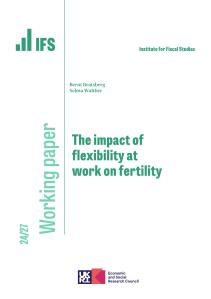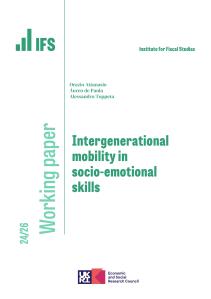We develop a new approach to the decomposition of income risk within a nonstationary model of intertemporal choice. The approach allows for changes in income risk over the life cycle and across the business cycle, allowing for mixtures of persistent and transitory components in the dynamic process for income. We focus on what can be learned from repeated cross-section data alone. Evidence from a stochastic simulation of consumption choices in a nonstationarity environment is used to show the robustness of the method for decomposing income risk. The approach is used to investigate the changes in income risk in Britain across the inequality growth period from the late 1970s to the late 1990s. We document peaks in the variance of permanent shocks at the time of recessions.
Authors

CPP Co-Director
Richard is Co-Director of the Centre for the Microeconomic Analysis of Public Policy (CPP) and Senior Research Fellow at IFS.

Research Fellow University of Oxford
Hamish is the James Meade Professor of Economics at the University of Oxford, a Professorial Fellow of Nuffield College and a Research Fellow at IFS.

Research Fellow University College London
Ian is a Research Fellow of the IFS and a Professor of Economics at UCL. He joined UCL in 1991 and has been attached to the IFS since 1990.
Resource details
- DOI
- 10.3982/QE44
- Publisher
- Wiley
Suggested citation
R, Blundell and H, Low and I, Preston. (2013). Decomposing changes in income risk using consumption data. London: Wiley.
More from IFS
Understand this issue

Where next for the state pension?
13 December 2023

Social mobility and wealth
12 December 2023

Autumn Statement 2023: IFS analysis
23 November 2023
Policy analysis

How would the parties’ tax and spending plans affect Scotland and Wales?
28 June 2024

General Election 2024: Manifesto Analysis Presentations
24 June 2024

How do the last five years measure up on levelling up?
19 June 2024
Academic research

The impact of labour demand shocks when occupational labour supplies are heterogeneous
28 June 2024

The impact of flexibility at work on fertility
11 June 2024

Intergenerational mobility in socio-emotional skills
5 June 2024